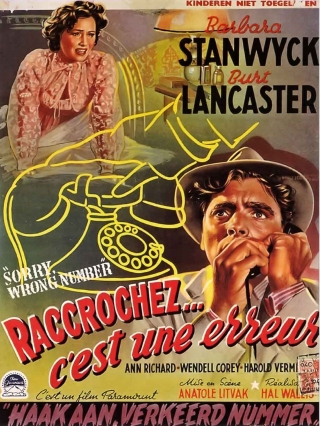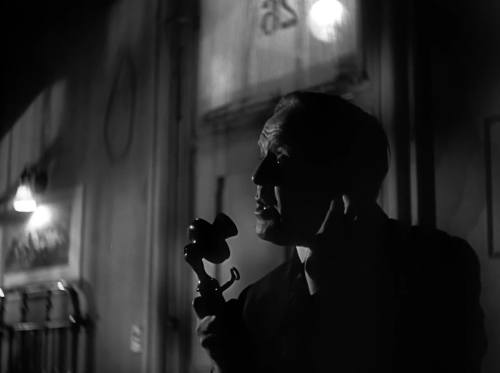I’ll start off by saying that I like films that employ flashbacks in the telling of the story. Of course, if this technique is going to be used it needs to be done well. An example of its misuse/abuse would be Passage to Marseille; where there are flashbacks within flashbacks within flashbacks to the point that the viewer is driven half crazy and loses all sense of time and place. Sorry, Wrong Number (1948) avoids falling into this trap. Here, those trips down memory lane are necessary to drive the story forward and they work perfectly.
The film was adapted from a radio play and summarising the plot is not so easy without giving away too much, and thus ruining it for anyone who hasn’t seen it. Almost all of the action is played out via a series of telephone conversations involving Leona Stevenson (Barbara Stanwyck). Leona is introduced as a rich, pampered invalid who lives in luxury in Manhattan and, alone and bed-ridden, has only her telephone as a means of communicating with the outside world. As a result of a crossed line, she overhears a conversation between two unknown men as they finalise the details of a murder soon to be committed. Naturally alarmed, Leona first tries to tip off the police but they profess an inability to act given the sketchy information available. Her next thought is to get in touch with her husband Henry (Burt Lancaster), but that proves more difficult. Her attempt to contact him results in a series phone calls (and accompanying flashbacks) which gradually build up a complete picture of Leona, Henry and their life together. With each call another piece of the puzzle falls into place, and Leona slowly arrives at a horrifying realization.
Barbara Stanwyck has come to be regarded as something of a noir icon, largely through her icy portrayal of Phyllis Dietrichson in Double Indemnity. Where that film cast her as the archetypal femme fatale, Sorry, Wrong Number has her play the helpless woman in distress. She does well here with a character that starts off as an unsympathetic figure. As Leona moves from an initial petulance, through frustration to panicked terror, she manages to avoid the temptation to overact. All the emotions on display fit in with the type of woman revealed over the course of the film. Burt Lancaster was in the middle of a series of noirs, or noir tinged movies, at this point and he’s pretty convincing in the role of Henry. He begins as a blue-collar bit of rough who catches Leona’s fancy, becomes her pet plaything, and finally allows his simmering frustration and innate greed to draw him into criminality. There are also plenty of good turns from a support cast which boasts Wendell Corey, Ed Begley, Leif Erickson and William Conrad. While this is a movie full of flawed and unsavoury characters, the one sympathetic figure is Harold Vermilyea’s Waldo Evans. He’s the soft-spoken little chemist who dreams and saves in the hope of owning a farm where horses can roam free. When Henry spins him a tale that promises enough cash to realise this dream, the poor sap falls for it and his fate is sealed.
Sorry, Wrong Number fits the noir bill by delivering a story where there are no winners and no happy endings. We have a roster of characters whose greed, selfishness and weakness set them on a path towards their own self-destruction. The moody photography of Sol Polito is another essential ingredient, and it’s at its most effective in the scenes on Staten Island. This desolate setting, especially the decrepit 20 Dunstan Terrace, is a place where you just know darkness lurks.
The film has long been available on DVD in R1 from Paramount, and it’s a pretty good transfer. The print used is clean but it does display very heavy grain, particularly in the darker scenes. As usual from Paramount there’s not much in the way of extras, just a theatrical trailer. Still, the disc can be picked up for very little and the quality of the movie alone is more than enough reason to justify a purchase.




You’ve covered Stanwyck in Noir, have you seen her in a great Western, “The Furies”?
LikeLike
Indeed I have Muriel. The Furies is an excellent movie that I really should get round to featuring on here some time soon.
I have a lot of time for Stanwyck as an actress; she was one of the very best. She seemed to move almost effortlessly back and forth between noir and westerns, and those two genres suited her particularly well, providing the framework to best highlight her talents.
LikeLike
A really interesting and descriptive review, I will definately consider watching it now. Also, was Antaloe Litvak the director of a film starring Olivia de Havilland called the snake pit, I’m not sure
LikeLike
He certainly did make The Snake Pit, an interesting movie. Litvak didn’t direct a huge number of movies but there are some worthwhile ones among his credits. I’ve done a piece on The Long Night, which seems to be a forgotten work now. Decision Before Dawn and Night of the Generals also have their points.
LikeLike
I will have a look at your review on the long night.Thanks for the suggestion.
LikeLike
Pingback: The Big Clock | Riding the High Country
I finally saw this recently and found it very impressive. I liked the fact that we learned things about each character in revealing ways, and at the same time as the protagonist. I think that definitely helped feeling the same as her in a distressing situation.
LikeLiked by 1 person
I like the structure a lot – it’s nicely handled and is never confusing, as could quite easily have been the case with the multiple flashbacks and constantly shifting viewpoints. Stanwyck’s character is completely self-absorbed and it’s a tribute to the actress that you do feel for her as the true nature of her situation becomes apparent.
LikeLiked by 1 person
I really dug it. It managed to be both contained within the apartment setting and then expansive yet mysterious in flashbacks. Loved Stanwyck and how her mood constantly shifts.
LikeLiked by 1 person
Oh, I like the movie a lot too for those reasons you mention and the lovely little character moments which pop up throughout. I meant to pick up a copy of the novelization – it’s originally an adaptation of a radio play – but can never seem to locate one for a price I’m willing to pay.
LikeLiked by 1 person
I’m planning on doing a review soon. So keep your eyes out.
LikeLike
Absolutely, will do! I think the film deserves a bit more praise and it’s good to see it brought to the attention of some more people.
LikeLiked by 1 person
I hope when I review it, I can do just that.
LikeLike
I don’t doubt it for a minute!
LikeLiked by 1 person
Thanks for that support.
LikeLiked by 1 person
Here’s my review of it. https://vinnieh.wordpress.com/2017/06/30/sorry-wrong-number/
LikeLike
On my way now…
LikeLiked by 1 person
Enjoy.
LikeLike